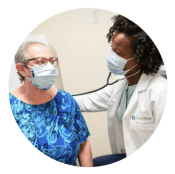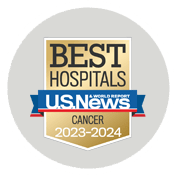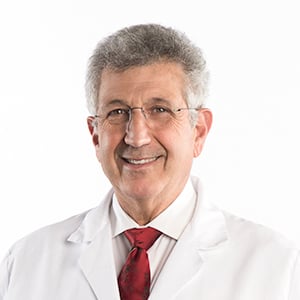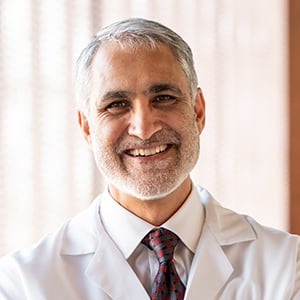Skin Cancer
Skin cancer remains the most prevalent of all cancers in the United States, more common than all other cancer diagnoses combined. And while melanoma makes up just a tiny portion of those cases (about 1%), it is also the most deadly.
According to the American Cancer Society, more than five million nonmelanoma skin cancers (basal and squamous cell cancers) are diagnosed each year in the U.S. About eight out of 10 of these are basal cell carcinoma.
“I am simply so excited by how my life has changed and by what I learned about myself since being diagnosed.”
- John Garner, skin cancer survivor
Skin cancer is the most commonly diagnosed cancer, and, in most cases, it is not life-threatening, nor does it spread to other parts of the body. The exception is melanoma, the rarest and most aggressive form of skin cancer.
City of Hope’s team of internationally trained dermatologists and dermatopathologists uses their clinical experience, expertise, and leading-edge technology to provide you with the most accurate diagnosis and effective treatment.
City of Hope’s approach to treating skin cancer starts with a coordinated, multidisciplinary care team whose primary goal is offering you the best, most individualized treatment plan. Your plan includes the newest therapies — including immunotherapies — and innovative treatment combinations effective for even the most advanced melanoma patients.
Skin cancer is a disease that can appear in different ways in the body. Clinical trials at City of Hope focus on those differences and on designing therapies that affect how skin cancer develops, progresses and spreads.
Skin cancer care at City of Hope means you are steps away from labs where our researchers develop new cancer treatments every day. As a result, that proximity offers benefits from something unique in cancer care — bench-to-bedside treatment.
When you come to City of Hope, you have access to a strong network of support services and staff to help you and your family along your skin cancer journey.
City of Hope is internationally recognized for its research and breakthrough treatments, has been named one of America’s top cancer hospitals by U.S. News & World Report for more than a decade.
Our Commitment To Providing Exceptional Care Includes:
- Promising new therapies as part of our clinical trials program, including novel intralesional injection therapies. These include studying commercially approved agents such as TVEC, an oncolytic virus that directly targets melanoma tumors with other therapies.
- Collaboration with the Melanoma Research Foundation, National Clinical Trials Network, Cytokine Working Group, SWOG Cancer Research Network, and Cancer Immunotherapy Trials Network, providing quick access to the newest therapies and clinical trials
- Deep experience with immunotherapy-based treatments — including pivotal clinical trials for widely used drugs like ipilimumab, nivolumab and pembrolizumab
- Expertise with isolated limb infusion, a focused chemotherapy treatment unavailable at most other cancer centers
- Our internationally trained dermatopathologist combines clinical experience with leading-edge technology to provide the most accurate diagnosis.
- Tumor testing and customized drug therapy tailored to the molecular profile of specific skin cancers
- Expertise in advanced facial reconstructive and microvascular procedures for patients with complex skin cancers
- Survivorship clinics — including physical therapy for lymphedema-related side effects — provide support and monitoring throughout the disease.
Your care includes regular interaction and input from a team that includes oncologists, surgeons, radiation oncologists, dermatologists and pathologists, along with nurses, social workers and specially trained support staff.

City of Hope is one of only a few dozen centers in the U.S. using a comprehensive approach by a multidisciplinary team whose sole focus is treating skin cancer.

Our developments in the areas of breakthrough cancer drugs, bone marrow transplants and CAR T cell therapy are recognized internationally.

Our leadership in research and innovation continually enhances our ability to provide novel and differentiated approaches to cancer care.
Arya Amini, M.D., is a radiation oncologist and associate professor in the Department of Radiation Oncology at City of Hope.

Antoine Lyonel Carré, M.D., M.P.H., is a plastic surgeon specializing in such areas as breast reconstruction, lymphedema, perineal reconstruction, abdominal wall reconstruction and targeted muscle reinnervation for chronic/phantom pain.

Jeff Chang, M.D., M.S., is a plastic surgeon specializing in oncologic reconstruction, lower extremity salvage, and lymphedema surgery.

Moshe Faynsod, M.D., is surgical oncologist at City of Hope ǀ South Bay in Torrance, California.

Thomas J. Gernon, M.D., is an otolaryngologist specializing in the treatment of head and neck cancers, particularly HPV-related malignancies, at City of Hope in Duarte and South Pasadena.

Robert Kang, M.D., brings his highly skilled expertise in advanced facial reconstructive and microvascular procedures to patients with complex and challenging head and neck cancers at City of Hope's comprehensive cancer center.

Ji Hyun Kim, M.D., is a radiation oncologist at City of Hope's South Bay site.

Aaron Lewis, M.D., is a surgeon at City of Hope's South Pasadena and Arcadia locations, specializing in general oncologic surgery.

Wai-Yee Li, M.D., Ph.D., is a plastic surgeon specializing in breast and skin cancer reconstruction and lymphedema.

Tiffany Loh, M.D., strives to address patients’ concerns in a caring, compassionate way. She knows that every patient is a unique individual, so she puts a priority on listening carefully and working with patients to ensure that their needs are met.

Ellie Maghami, M.D., is a head, neck and thyroid cancer surgeon and The Norman and Sadie Lee Foundation Endowed Professor in Head and Neck Cancer.

Laleh G. Melstrom, M.D., M.S., specializes in melanoma and pancreatic cancers.
Dermatologist Badri Modi, M.D., focuses on high-risk skin cancers and melanoma and is an associate clinical professor in the Division of Dermatology.

I. Benjamin Paz, M.D., is a nationally renowned surgical oncology surgeon, with expertise in breast cancer, gastrointestinal and rectal cancers, and tumors involving the bone and soft tissues.

Heather Player, M.D., is breast and colon cancer surgeon and an assistant clinical professor in the Division of Surgical Oncology at City of Hope. She practices at City of Hope | Antelope Valley and Mission Hills.

Christiane Querfeld, M.D., Ph.D., is a dermatologist and dermatopathologist who specializes in the diagnosis and treatment of cutaneous lymphoma.

Sagus Sampath, M.D., Radiation Oncologist | City of Hope, Los Angeles, California.

Hans Schoellhammer, M.D., is a surgical oncologist and melanoma expert at City of Hope.

Vijay Trisal, M.D., the Dr. Norman & Melinda Payson Professor in Medicine, is the system chief clinical officer responsible for setting the vision and direction for systemwide quality, patient safety, and developing guidelines for clinical pathways and protocols.




